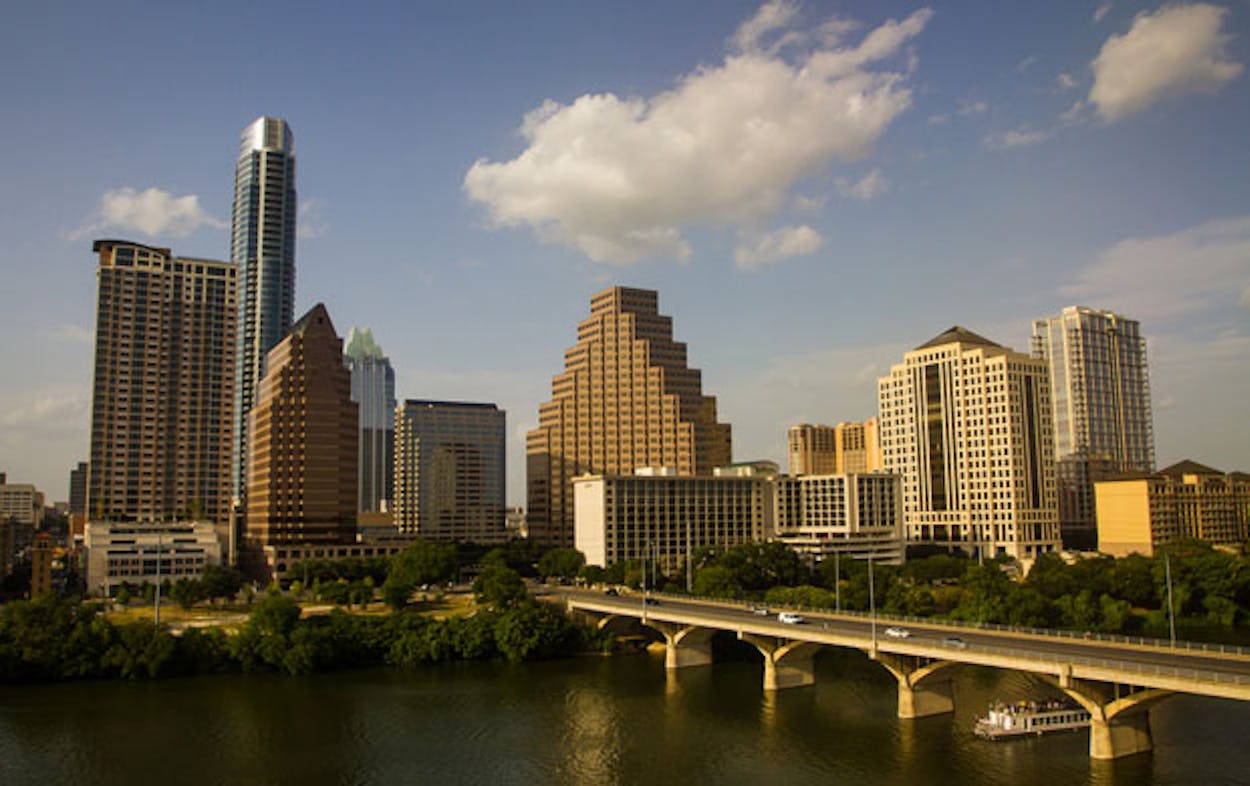The Texas economy is one of the most robust in the world. Wildly profitable companies and ingenious entrepreneurs call this state home, and what happens here influences businesses around the nation. Here’s a slice of the profits, losses, big deals, and backroom decisions happening across Texas this week.
Construction Junction
Austin’s downtown construction boom got a shout-out in the New York Times this week. Dozens of hotel, office, retail and residential projects are underway or about to begin, spurred by an “influx of young and highly educated workers” and the arrival of tech companies including Facebook, Google and Cirrus Logic.
There are now about 1,500 residential condominium units and 1,500 rental apartments in the downtown area, and about 500 more apartments are currently under construction, according to the article. Also, more than 2,000 new hotel rooms are planned in the central business district, a significant addition to the 6,000 existing rooms.
The Bottom Line: While demand for condos took a hit during the recession, the rental occupancy rate downtown remains at a strong 97 percent. And while Austin used to be known for its inexpensive housing, “the citywide average monthly apartment rental rate of $1.10 a square foot is the highest in the state, and downtown apartment rents are more than twice the city average,” the Times reports.
Tax Axed for Backpacks and Slacks
Texas’ annual sales tax–free weekend starts Friday, and shoppers are expected to save about $65 million over the next three days. The holiday, introduced by the State Legislature in 1999 as a way to help families save money on back-to-school shopping, applies to clothing and school supplies priced under $100. The San Antonio Business Journal reports that Texans have saved $626.9 million since the program began.
In addition to traditional retailers, the exemption also applies to online and catalog sales. Amazon confirmed this week that it will not charge sales taxes on qualified items purchased by Texas customers.
The Bottom Line: While the weekend gives shoppers a break, it also causes the state to lose out on that $65 million in a lean budget year, according to the Texas Tribune. But State Sen. Rodney Ellis, who authored the law that created the holiday, calls the $65 million “a drop in the bucket compared to the hundreds of millions of dollars, the billions of dollars, given away to energy companies, ag exemptions, all kinds of tax breaks.”
Oil Buy That for a Dollar
BP is looking to sell its refinery in Texas City by the end of the year, and Valero may be looking to buy, according to the Houston Chronicle. The asking price has not been disclosed, but analysts estimate the plant, which processes 475,000 barrels of oil per day, could be worth about $2 billion. BP recently did business with another San Antonio oil company, Tesoro Corp., which bought a Los Angeles-area refinery from the British oil conglomerate in a deal worth $1.2 billion.
While San Antonio-based Valero won’t comment on whether it plans to make an offer, it has hinted that it is in the market for a similar facility. “A refinery along the Gulf Coast is more advantageous than other parts of the country, because of advantages of water access, the availability of crude oil, access to export markets and low cost of doing business relative to the rest of the U.S.,” a company spokesman said recently.
The Bottom Line: The Chronicle also reports that the refinery’s “troubled safety history” is another factor in the sale. An explosion killed 15 workers in 2005, and four others have died in accidents since then. BP has agreed to pay $13 million in fines in connection with the deaths, but it is still in negotiations over other safety violations. If those issues are not resolved by the time the refinery is sold, the citations will carry over and become the buyer’s responsibility.
Winner of the Week: C3 Presents
Depending on who you ask, Austin’s fall festival season either got a little more interesting or a lot more chaotic. On Thursday the Austin City Council unanimously voted to move forward with a proposal to add a second weekend to the Austin City Limits Music Festival beginning in 2013. In exchange, the festival’s producers, Austin-based C3 Presents, have agreed to donate more money for city park improvements, reports the Austin American-Statesman.
According to Billboard Boxscore, C3 took in more than $15 million in ticket sales at last year’s event and stands to make significantly more with the extra weekend next year. Another major music festival, the Coachella Valley Music and Arts Festival in California, expanded to two weekends for the first time in April, and gross ticket sales increased from $23 million in 2011 to $47 million this year.
Loser of the Week: Sysco
Houston-based food distributor Sysco had a lean fourth quarter, with an 8 percent decline in net income due in part to the rising cost of food. “Food costs climbed 3.3 percent in the quarter, mostly because of price hikes for poultry, meat and canned/dry goods,” Bloomberg Businessweek reports. However, the company also saw an increase in both quarterly revenue (up 6 percent to $11.05 billion) and annual revenue (up 8 percent to $42.38 billion).






